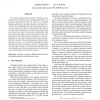Free Online Productivity Tools
i2Speak
i2Symbol
i2OCR
iTex2Img
iWeb2Print
iWeb2Shot
i2Type
iPdf2Split
iPdf2Merge
i2Bopomofo
i2Arabic
i2Style
i2Image
i2PDF
iLatex2Rtf
Sci2ools
PG
2002
IEEE
2002
IEEE
Isosurface Reconstruction with Topology Control
Extracting isosurfaces from volumetric datasets is an essential step for indirect volume rendering algorithms. For physically measured data like it is used, e.g. in medical imaging applications one often introduces topological errors such as small handles that stem from measurement inaccuracy and cavities that are generated by tight folds of an organ. During isosurface extraction these measurement errors result in a surface whose genus is much higher than that of the actual surface. In many cases however, the topological type of the object under consideration is known beforehand, e.g., the cortex of a human brain is always homeomorphic to a sphere. By using topology preserving morphological operators we can exploit this knowledge to gradually dilate an initial set of voxels with correct topology until it fits the target isosurface. This approach avoids the formation of handles and cavities and guarantees a topologically correct reconstruction of the object’s surface.
Computer Graphics | Medical Imaging Applications | PG 2002 | Topological Errors | Volume Rendering Algorithms |
Related Content
| Added | 15 Jul 2010 |
| Updated | 15 Jul 2010 |
| Type | Conference |
| Year | 2002 |
| Where | PG |
| Authors | Stephan Bischoff, Leif Kobbelt |
Comments (0)

